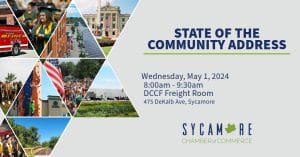Illinois Minimum Wage Law
The Illinois Minimum Wage Law continues to increase in 2025, effective January 1 the new minimum wage rate for individuals aged 18 and older increases to $15 per hour. Youth under age 18 working less than 650 hours per calendar year may be paid $13 per hour. New employees over the age of 18 who do not receive tips may be paid up to $0.50 less per hour (no less than $14.50 per hour) for first 90 days of employment.
Wage Increases for Tipped Employees effective January 1st, 2025: Effective January 1st, 2025, the minimum wage for tipped employees will increase to $9.00 per hour.
Though the minimum wage increase might seem overwhelming, recognizing the potential benefits in employee satisfaction and retention is important. Staying updated on the changes to the Illinois Minimum Wage Law and modifying your business practices as needed can ensure your business’s compliance and ongoing success.
More minimum wage information from the Illinois Department of Labor can be found here.
The Illinois Paid Leave for All Workers Act (PLAWA) continues in 2025.
Under this Act, employees shall accrue paid time off at the rate of one hour for every 40 hours worked (starting on the first day of employment for new employees). Ninety days following the commencement of employment, workers can begin using paid time off for any reason without documentation to their employer. Employees will be paid their full wage while on leave and tipped workers will be paid their normal minimum wage. Employers cannot require an employee to find their replacement for the leave. For existing employees, any unused PLAWA accrued in 2024 is entitled to carryover in 2025. There are very few employers that are exempt from this act – please make sure you are following its requirements. For more information, visit the Illinois Department of Labor website.
IRS Mileage Rate
The standard IRS mileage rate for 2025 has been increased to .70 cents a mile as of January 1, 2025.
Updates to Federal and State labor laws go into effect in 2025. Please revise your required posters and comply accordingly. Federal and State required posters and disclosures can be found here.
ILLINOIS HUMAN RIGHTS ACT
(SB 3310/PA 103-0973): Extends the deadline for employees to file discrimination charges from 300 days to 2 years but does not affect claims under the federal Equal Employment Opportunity Commission.
(HB 4867/PA 103-0785): Amended to include the prohibition of discrimination on the basis of “reproductive health decisions.”
(HB 2161/PA 103-0797): Amended to include the prohibition of discrimination on the basis of “family responsibilities.”
EQUAL PAY ACT
(HB 3129/PA 103-0539): Requires employers with 15+ employees to include pay scale and benefits in job postings for Illinois-based or reporting positions, notify current employees of promotion opportunities within 14 days of external postings, and imposes escalating penalties for noncompliance, ranging from $500 to $10,000.
Personnel Record Review Act
(HB 3763/PA 103-0845): Expands the documents employers must provide to employees upon request to include benefits-related records, employment contracts, handbooks, and policies affecting employment qualifications. It clarifies that requests for personnel records must be made in writing, with a 7-day response deadline from receipt, and outlines specific requirements for the employee’s request. It also allows employees to file suit in state court if an Illinois Department of Labor (IDOL) complaint is not resolved within 180 days, with the possibility of seeking attorney fees.
Illinois Wage Payment and Collection Act
(SB 3208/PA 103-0953): Requires employers to provide employees with copies of pay stubs within 21 days of request, up to twice in any 12-month period, including the 12 months following employment separation. Employers must retain pay stubs for 3 years and may require requests to be made in writing to the individual responsible for maintaining the records.
Illinois Freedom to Work Act
(SB 2737/PA 103-0915): Limits the enforce ability of non-compete and non-solicit agreements in the mental health industry for providers serving veterans and first responders, making such covenants unenforceable if their enforcement would likely increase the cost or difficulty for veterans or first responders seeking mental health services.
SEPTEMBER 2024 – ILLINOIS SECURE CHOICE
Illinois state law now requires every private-sector employer that has been in business for at least 2 years and had 5 or more Illinois employees in every quarter last year must offer their own qualified retirement plan or facilitate the Illinois Secure Choice retirement savings program. In this session, the Illinois State Treasurer’s Office will cover the specifics of the state law and provide an overview of how Illinois Secure Choice works and how easy it is for businesses to facilitate retirement savings for their employees. Employers who do not meet their required deadlines may be subject to enforcement, including financial penalties*. For details click here.
JANUARY 2024
Maintaining compliance with the 2024 legal changes for your Illinois business requires staying updated, modifying your policies, and consulting legal counsel when necessary.
Taking proactive measures and adapting to the new regulations can position your business for success in the future.
Illinois Minimum Wage Law
The Illinois Minimum Wage Law continues to increase in 2024, with the new minimum wage rate set at $14 per hour starting January 1, 2024. Tipped wages are $8.40 per hour and youths under 18, working less than 650 hours in a calendar year is $12 per hour. This change will have a significant impact on both businesses and their payroll budgets, as they must adjust to the higher wages for their employees.
Though the minimum wage increase might seem overwhelming, recognizing the potential benefits in employee satisfaction and retention is important. Staying updated on the changes to the Illinois Minimum Wage Law and modifying your business practices as needed can ensure your business’s compliance and ongoing success.
beneficial ownership information reporting
A new federal law that took effect on January 1, 2024, impacts many Illinois business owners and companies by requiring them to report Beneficial Ownership Information (BOI) to the federal government. Many IL businesses must now submit reports on their beneficial owner(s) to the U.S. Treasury’s Financial Crimes Enforcement Network (FinCEN). Filing is simple and free. For information and free resources to help with filing Illinois Secretary of State’s Department of Business Services page at ILSOS.gov.
What it Means:
Under the new requirement, these small- to mid-sized businesses must now disclose their beneficial owners (individuals who own or control the company) to the Financial Crimes Enforcement Network (FinCEN), a bureau within the U.S. Treasury Department.
Who Needs to Register?
All domestic and foreign corporations, LLCs and other business entities with fewer than 20 employees in the U.S. and less than $5 million in gross receipts or sales. FinCEN has provided a list of 23 exemptions that apply. Otherwise, if a company was created or is registered to operate in the U.S. by filing documents with the Secretary of State’s office, it must file.
How Do Companies Register?
Businesses will need to file a Beneficial Ownership Information (BOI) Report with the FinCEN. A beneficial owner owns at least 25% of a company or has “substantial control” over it — meaning a senior officer, important decision-maker or someone who can appoint and remove officers.
paid Leave for All Workers Act
On January 1, 2024, the Paid Leave for All Workers Act will take effect, requiring employers to offer a minimum of one hour of paid leave for every 40 hours worked, with a maximum of 40 hours per 12-month period. This law applies to all eligible employees, ensuring that they can take paid time off for any reason, including sick leave and personal matters. Employers must adhere to specific record keeping and notice requirements, and they cannot demand documentation or verification for leave requests. With this new law, employees can now enjoy the benefits of hours of paid leave. Read the Law: 820 ILCS 192/Paid Leave for All Workers Act. (ilga.gov)
The Illinois Department of Labor (IDOL) has provided limited guidance on the Paid Leave for All Workers Act, including how pre-tax dollars can be used for certain benefits. Remaining compliant as an employer necessitates staying updated on the new regulations and modifying your policies accordingly. For frequently asked questions visit https://labor.illinois.gov/faqs/paidleavefaq.html or email DOL.PaidLeave@illinois.gov
Child Extended Bereavement Leave Act
The Child Extended Bereavement Leave Act of 2024 offers additional support for employees grieving the loss of a child. Employers with 50 or more full-time employees must provide unpaid, job-protected leave for varying durations based on company size. Companies with more than 250 full-time employees must offer up to 12 weeks of leave in a single year. Those with 50 to 249 employees have to provide up to six weeks annually.
To be eligible for this leave, employees must have been employed with a covered employer for a minimum of two weeks prior to the commencement of the leave. Employers may require reasonable documentation, such as a death certificate or obituary, to support the leave request. Comprehending and enacting these new bereavement leave regulations enables you to support your employees during their time of need. Frequently asked questions visit https://labor.illinois.gov/faqs/flbafaqs.html
Wage Payment Collection Act
The Illinois Wage Payment Collection Act enforces the timely and accurate payment of wages to employees in Illinois. This law stipulates that employers must pay full and ‘final compensation’ to separated employees no later than their next regularly scheduled payday. Frequently asked questions visit https://labor.illinois.gov/laws-rules/fls/wage-payment-collection.html
Non-compliance with the Wage Payment Collection Act can result in severe penalties for employers, including fines and potential employee lawsuits. Avoiding these consequences requires Illinois businesses to keep precise records, ensure timely wage payments, and stay updated on any changes to the law.
Non-compliance with the Wage Payment Collection Act can result in severe penalties for employers, including fines and potential employee lawsuits. Avoiding these consequences requires Illinois businesses to keep precise records, ensure timely wage payments, and stay updated on any changes to the law.
Enhanced Employee Rights and Protections
Covered employees in Illinois will also see increased rights and protections in 2024, with amendments to the Gender Violence Act and the Victims’ Economic Security and Safety Act (VESSA). These updates, aimed at enhancing Illinois victims economic security, are designed to enhance employee rights and ensure a safe and inclusive work environment.
Gender Violence Act Amendments
Amendments to the Illinois Gender Violence Act now allow victims of gender-related violence in the workplace to sue their employers if the employers fail to act reasonably and investigate reports of such violence. Employers may be held liable for gender-related violence committed in the workplace by their employees or agents under specific circumstances, such as if the violence occurs while the employee was directly performing their job duties, or while the employer’s agent was directly involved in the gender-related violence and the performance of the contracted work was the proximate cause of the injury.
These amendments place a greater responsibility on employers to address and prevent gender-related violence in the workplace. Comprehending the changes to the Gender Violence Act and enacting suitable policies and procedures can assist in creating a safe and supportive environment for all employees.
VESSA Amendments
The Victims’ Economic Security and Safety Act (VESSA) in Illinois has been amended to expand qualifying reasons for leave and introduce “Violent Crime Bereavement” regulations. Under the VESSA amendments, individuals whose family or household member(s) are killed in a crime of violence can take leave to attend a funeral or wake, make arrangements for a funeral or wake, and grieve.
These amendments provide additional support for employees affected by domestic, sexual, or gender violence, ensuring they have access to the necessary time off and resources to recover and heal. Understanding the VESSA amendments and modifying your policies as necessary is important as an employer to support your employees during challenging times.
Personnel Records and Electronic Distribution of Employee Notices
Changes to the Illinois Personnel Record Review Act (PRRA) remove restrictions on obtaining personnel records and impose new obligations on employers regarding electronic distribution of employee notices and summaries. These updates aim to promote transparency and ease of access to information for both employers and employees. View Frequently Asked Questions. Or contact 312-793-2800 or email dol.prra@illinois.gov
Updates to Temporary Labor Services Act
Temporary workers in Illinois will benefit from new rights and protections under the amended Temporary Labor Services Act. These updates include:
- Equal compensation
- Prior notification of labor disputes
- Safety training
- Increased penalties for non-compliance
The new law requires employers, including temporary labor service agencies, independent contractors, and third-party clients, to inform temporary workers of potential safety hazards at the worksite. They must also provide appropriate training on how to safely tackle them.
Temporary workers also reserve the right to refuse a new task at a third-party client’s worksite if it has not been communicated to them or if they lack the required training. Should a temporary worker encounter new safety hazards during their assignment, the third-party client is obliged to inform both the temporary labor service agency and the worker. This includes providing suitable safety training and required personal protective equipment before altering the worker’s assignment. To train temporary workers effectively, freelance worker’s acceptance of these conditions is crucial for ensuring a safe and productive work environment.
Employers and employees across the State should be aware of current issues and new laws taking effect that impact workplace rights.
- “Legislation passed by the General Assembly and signed into law by Governor JB Pritzker in 2022 expands upon and changes certain rights and protections in the workplace,” said Illinois Department of Labor Acting Director Jane Flanagan. “It’s important for employers and employees to be aware of the new laws taking effect January 1st, and those already in effect.”
- In 2019, Governor Pritzker led the effort to increase the minimum wage for workers in Illinois. The law passed increases the wage by $1 every year through 2025. This year the minimum wage increases to $13 an hour, and $7.80 an hour for tipped workers. Workers in the Chicago and Cook County area should be aware that the minimum wage may be higher there due to local ordinances.
- Unpaid leave rights are being expanded for employees. The Family Bereavement Leave Act (FBLA) amends what was the Child Bereavement Leave Act (CBLA) to expand job-protected leave to cover pregnancy loss, failed adoptions, unsuccessful reproductive procedures, and other diagnoses or events negatively impacting pregnancy or fertility. The FBLA also now requires employers to provide leave time after the loss of family members such as parents or siblings. Employees may take up to two weeks, or 10 working days, of unpaid leave time for any of the events covered by the FBLA.
- The amended One Day Rest in Seven Act (ODRISA) gives workers the right to a day of rest every workweek and breaks for meals or rest during daily work shifts. Employers covered by ODRISA must post a notice at the workplace informing workers of their rights under the Act. The notice is available on the IDOL website.
- An amendment to the Employee Sick Leave Act mandates that employers who provide sick leave benefits must allow employees to take leave in the event of a family member illness on the same conditions which the employee can take leave for their own illness.
JULY 1, 2022 – PUBLIC ACTS AFFECTING BUSINESSES
| 7/1/2022 | 102-0069 | SB 00061 | INS-IMPROPER CLAIMS PRACTICE |
| 7/1/2022 | 102-0157 | SB 00605 | SCH CD-TRUANCY POLICY |
| 7/1/2022 | 102-0160 | SB 02664 | NOTARY-ELECTRONIC DOCUMENTS |
| 7/1/2022 | 102-0199 | HB 01746 | STUDENT RECORD/CONFERENCE-DCFS |
| 7/1/2022 | 102-0267 | HB 00577 | SCH CD-PREVENT YOUTH SUICIDE |
| 7/1/2022 | 102-0286 | SB 00294 | WIPES LABELING ACT |
| 7/1/2022 | 102-0373 | SB 02014 | HIGHER ED-MENTAL HEALTH-STU ID |
| 7/1/2022 | 102-0416 | HB 01778 | STUDENT ID-SUICIDE PREV INFO |
| 7/1/2022 | 102-0594 | HB 02438 | SCH CD-SCH REPORT CARD-TEACHER |
| 7/1/2022 | 102-0622 | SB 00662 | HIGHER ED-SOCIAL WORKER-GRANT |
| 7/1/2022 | 102-0688 | HB 00692 | CHILD CARE ACT-HOST HOMES |
| 7/1/2022 | 102-0778 | HB 04595 | INS-DRUG DISCOUNT PROGRAM |
| 7/1/2022 | 102-0901 | HB 04703 | INSURANCE-BILLING |
| 7/1/2022 | 102-0935 | HB 04452 | COUNTIES-WIND ENERGY FACILITY |
| 7/1/2022 | 102-0941 | HB 04639 | SOS-MANUFACTURED HOME DEALERS |
| 7/1/2022 | 102-0946 | HB 04666 | FUNERAL DIRECTOR-VARIOUS |
| 7/1/2022 | 102-0962 | HB 04999 | EARLY INTERVENTION SERVICES |
| 7/1/2022 | 102-1062 | HB 04326 | SCHOOL FACILITY OCCUP REVENUE |
ON JANUARY 1, 2022, ILLINOIS’ AMENDMENT TO THE ILLINOIS FREEDOM TO WORK ACT (IFWA) WILL TAKE EFFECT. THE AMENDED STATUTE WILL RENDER UNENFORCEABLE NON-COMPETE AGREEMENTS WITH EMPLOYEES EARNING LESS THAN $75,000 ANNUALLY.
On August 13, 2021, Illinois Governor JB Pritzker signed into law Senate Bill 672 (“SB 672”) which amends the Illinois Freedom to Work Act (the “Act”). The sweeping changes limit when restrictive covenants entered after January 1, 2022 can be enforced against Illinois employees; the Act does not apply retroactively.
https://www.ilga.gov/legislation/ilcs/ilcs3.asp?ActID=3737&ChapterID=68
JANUARY 2021 – UNDER THE NEW LAW, THE MINIMUM WAGE WILL INCREASE TO $11 PER HOUR ON JANUARY 1, 2021.
That amount will continue to expand on an annual basis until it reaches $15 per hour on January 1, 2025. Please be aware of the Hourly Minimum Rate in Illinois. Click here for information and details from the Illinois Department of Labor.
RACE TO $15 – MINIMUM WAGE INCREASE — ILLINOIS DEPARTMENT OF LABOR ISSUES MINIMUM WAGE HIKE REMINDER PRESS RELEASE
Illinois became the fifth state to join the “Race to $15” and pass a minimum wage increase under which Illinois’ minimum wage will reach $15 per hour by 2025. Effective January 1, 2020, Illinois’ new minimum wage is $9.25 per hour, followed by an additional increase to $10 per hour effective July 1, 2020. The statewide minimum wage continues to increase by $1 on July 1 of each subsequent year so the minimum wage will be $11 per hour in 2021; $12 per hour in 2022: $13 per hour in 2023; $14 per hour in 2024; and $15 per hour in 2025. The statewide minimum wage increase preserves a lower rate available for tipped workers and for teen workers (under 18) meeting certain requirements. Small employers (under 50 employees) also have tax credits available to help offset the actual costs of complying with the minimum wage increases that will be available through 2025.
Chicago employers should be aware of a pending municipal ordinance that would accelerate the minimum wage increase from $13 per hour (effective July 1, 2020) to $15 per hour by July 1, 2021.
Employers should review job descriptions and postings and ensure all positions meet these new requirements. Small employers (under 50 employees) should consult with their tax providers to ensure they receive accurate tax credits that may be available for their increased wage payments.
Training Requirements: Reminder – In 2020, Illinois added a Sexual Harassment Prevention Training requirement under the State’s Human Rights Act (IHRA) and enforced by the Illinois Department of Human Rights (IDHR). IHRA requires annual training. Restaurants and Bars have additional requirements for supplemental training. Find the free model training materials at State of Illinois Model Sexual Harassment Prevention Training Program – Training. You can conduct the training yourself, hire a consultant, or find a vendor that offers compliant on-online video or seminar training for a fee. Included in this requirement is a mandate to report sexual harassment complaints and investigations to the State.
Poster Requirements: All 50 states plus the District of Columbia have requirements for workplace posters based on state law, in addition to Federal requirements. Find Federal poster requirements at Workplace Posters | U.S. Department of Labor (dol.gov). The USDOL helps with determining poster requirements at elaws – FirstStep Poster Advisor (dol.gov). Specific requirements for Illinois posters are at Required Posters – Employers (illinois.gov). All posters at the links above are downloadable free of charge. Alternatively, you can buy posters with all the requirements, laminated or not, from many sources. Be sure to look for 2021 variations and shop around because prices vary widely. Most vendors offer poster sets (or all-in-one posters) that combine federal, state, and OSHA requirements. Because of minimum wage changes and the requirement to post employee rights under the IHRA, Illinois employers need new posters for 2021.
DECEMBER 17, 2020 – EEOC UPDATES GUIDANCE ON EMPLOYER COVID-19 VACCINATION POLICIES
The Equal Employment Opportunity Commission (EEOC) has released updated guidance on the responsibilities and rights of employers and employees related to the COVID-19 vaccine, including in cases where employers require employees to be vaccinated.
The publication, “What You Should Know About COVID-19 and the ADA, the Rehabilitation Act, and Other EEO Laws,” includes a section providing information to employers and employees about how a COVID-19 vaccination interacts with the legal requirements of the the Americans with Disabilities Act (ADA), Title VII of the Civil Rights Act of 1964, and the Genetic Information Nondiscrimination Act (GINA).
NOVEMBER 2020 – SMALL BUSINESS RETIREMENT PLANS (FOR BUSINESSES WITH 25-99 EMPLOYEES)
Illinois Secure Choice is a Roth IRA program run by the Illinois Treasurer’s Office. This program is directed at employers (with 25 or more employees) that do not already offer a savings plan for their employees. Employers with 25-99 employees must register by October.
The savings accounts are owned by individual participants and will be portable from job-to-job. Their accounts will be pooled and managed by a private investment company selected through a competitive bidding process.
- Their Illinois Secure Choice account is a Roth IRA
- The default savings rate is 5% of gross pay, but they can choose to change their contribution level or fund option at any time
- Employees will be auto enrolled after 30 days and will begin saving through payroll contributions
- Employees who do not want to participate MUST opt-out.
OCTOBER 2020 – PUBLIC ACT 101-0177 WAGE HISTORY QUESTION PROHIBITION (EFFECTIVE OCT. 1)
Amends the Equal Pay Act of 2003 prohibiting an employer from:
- screening job applicants based on their wage or salary history,
- requiring that an applicant’s prior wages satisfy minimum or maximum criteria,
- requesting or requiring that an applicant disclose prior wages or salary as a condition of being interviewed or as a condition of continuing to be considered for an offer of employment.
- The law prohibits an employer from seeking the salary, including benefits or other compensation or salary history, of a job applicant from any current or former employer, with some exceptions.
- Potential employees may freely provide past salary information, but employers must not ask for it.
Employers who do not comply could face fines and penalties from the Illinois Department of Labor and well as potential civil action and lawsuits.
JULY 2020 – PUBLIC ACT 101-0430 HUMAN RIGHTS ACT EXPANDED COVERAGE
In addition to the new employer obligations under the WTA, the Illinois Legislature also significantly expanded the coverage of the Human Rights Act to nearly all small businesses. Effective July 1, 2020, the requirements of the Human Rights Act apply to any employer with one or more employees working within Illinois during 20 or more calendar weeks during the current year, or during the year preceding the alleged discrimination violation. The Human Rights Act currently applies only to employers with 15 or more employees for discrimination allegations (other than those related to disability, pregnancy or sexual harassment, which already apply to all employers).
Employers required poster includes the information needed for Wage Payment and Collection Act, Child Labor Law, Minimum Wage Law, Equal Pay Act, Victims’ Economic Security and Safety Act and the One Day Rest in Seven Act.
JANUARY 2020 – PUBLIC ACT 101-0221 EMPLOYMENT DISCRIMINATION/SEXUAL HARASSMENT (EFFECTIVE JAN. 1, 2020)
Every employer with employees working in the State of Illinois must provide annual sexual harassment prevention training by December 31, 2020, and annually thereafter.
We have an Anti-Harassment Policy template and an Anti-Harassment Policy Checklist free to our members call us at 815-895-3456.
Additionally, restaurants and bars must establish and disseminate a written policy on sexual harassment prevention training and provide “supplemental” sexual harassment prevention training. Every employer must keep an internal record of compliance, such as sign-in sheets for group training, signed employee acknowledgment of completion, a certificate of participation with a copy retained by the employer, or any other format that identifies who attended what training, on what date. Following is the official notice of the Minimum Training Standards from the Illinois Department of Human Rights.
Employers Must Provide Sexual Harassment Prevention Training
Every employer with employees working in the State of Illinois is required to provide all employees with annual sexual harassment prevention training that complies with Section 2-109 of the Illinois Human Rights Act (“IHRA”). Employers may develop their own sexual harassment prevention training program that meets or exceeds the minimum standards for sexual harassment prevention training as outlined in Section 2-109(B) of the IHRA, or they may use the model sexual harassment prevention training developed by the Illinois Department of Human Rights (“IDHR”).
For new employees, training must occur within 90 days of hire. Furthermore, from now on, the law requires annual sexual harassment training. See more information about the IHR training compliance at https://www2.illinois.gov/dhr/Training/Pages/State-of-Illinois-Sexual-Harassment-Prevention-Training-Model.aspx
Restaurants and bars are required to provide “supplemental” sexual harassment prevention training that complies with Section 2-110 of the IHRA.
Minimum Standards for Sexual Harassment Prevention Training
Employers may develop their own sexual harassment prevention training programs provided they meet or exceed the minimum training standards outlined in Section 2-109(B), which include:
- an explanation of sexual harassment consistent with the IHRA;
- examples of conduct that constitutes unlawful sexual harassment;
- a summary of relevant federal and State statutory provisions concerning sexual harassment, including remedies available to victims of sexual harassment; and
- a summary of employers’ responsibilities in the prevention, investigation, and corrective measures of sexual harassment.
Additional Compliance Information
- Supplemental Training. To satisfy the requirements under Section 2-109, employers may use IDHR’s model sexual harassment prevention training program to supplement any existing program an employer is utilizing or develops.
- Deadline to Train Employees. Employers must train employees by December 31, 2020, and on an annual basis thereafter.
- Civil Penalty. Any employer that violates Section 2-109 will be issued a notice to show cause giving the employer 30 days to comply. Failure to comply within 30 days will result in IDHR petitioning the Illinois Human Rights Commission for entry of an order imposing a civil penalty against the employer.
For more information, please visit IDHR’s website at www.illinois.gov/dhr/training. View Section 2-109 and Section 2-110 of the Illinois Human Rights Act.
A Handout version of this notice: https://www2.illinois.gov/dhr/Training/Documents/IDHR_SHP-TR01_Minimum_Standards_Training-Ver20200127.pdf
Download the Model Training Provided by IDHR (English and Spanish versions): https://www2.illinois.gov/dhr/Training/Pages/State-of-Illinois-Sexual-Harassment-Prevention-Training-Model.aspx
There are numerous vendors providing training on-line for fees. An on-line search of “Illinois Sexual Harassment Law Training Options” will give a view to availability.
Other Resources
FAQ for Sexual Harassment Prevention Training: https://www2.illinois.gov/dhr/Training/Pages/FAQ%20for%20Sexual%20Harassment%20Prevention%20Training.aspx
Access to the Institute for Training and Development https://www2.illinois.gov/dhr/Training/Pages/FAQ%20for%20Sexual%20Harassment%20Prevention%20Training.aspx
Illinois Department of Human Rights (IDHR) Facebook Page: https://www.facebook.com/IllinoisDHR/
Illinois Department of Human Rights (IDHR) Eventbrite site for all currently available training conducted by IDHR: https://www.eventbrite.com/o/illinois-department-of-human-rights-357295684
The Illinois Restaurant Association information Links for training and a policy template for members: https://www.illinoisrestaurants.org/page/SexualHarassment
JANUARY 2020 – CANNABIS REGULATION AND TAX ACT
On January 1, 2020, Illinois became the 11th state to legalize adult-use cannabis. The Cannabis Regulation and Tax Act is comprehensive and will impact employers in many ways. Following Illinois’ legalization of medical cannabis in 2014, marijuana now will be available for recreational use by all adults age 21 and older, while remaining an unlawful controlled substance under federal law. As a result, Illinois employers must ensure that they have considered their organization’s philosophy for dealing with marijuana in the application and disciplinary process for all positions and employees.
JANUARY 2020 – EXPANSION OF VESSA PROTECTIONS
Effective January 1, 2020, the WTA also expanded the victim protections available under the Victims’ Economic Security and Safety Act (VESSA). VESSA has long provided for job-protected unpaid leave (similar to that available under the federal Family and Medical Leave Act) for victims of sexual violence, assault or stalking. Such leave is available to victims for a period of four to 12 weeks, depending on the size of the employer. Under the WTA, such leave now is available for victims of “gender violence.” Gender violence includes one or more acts of violence or aggression that is based on a person’s actual or perceived sex or gender, or a physical intrusion or invasion of a sexual nature under coercive conditions, either of which that satisfy the requirements for any crime under state law. There is no requirement that such gender violence crimes result in an arrest, prosecution or conviction, and gender violence also may include threats of such violence. Employers should ensure their VESSA policies include this expanded coverage.





